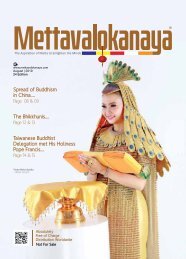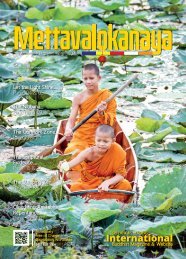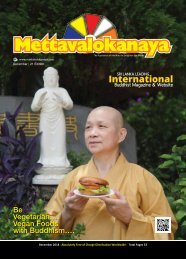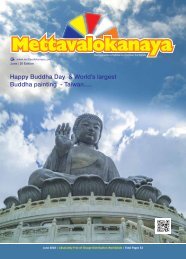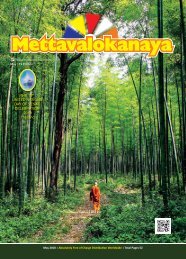Mettavalokanaya_Buddhist_Magazine_March_2019
“Mettavalokanaya” International Monthly Buddhist Magazine has been successfully distributed to 40 countries including all districts across Sri Lanka and now “Mettavalokanaya” is Sri Lankan Most Popular & Leading monthly Buddhist Magazine.
“Mettavalokanaya” International Monthly Buddhist Magazine has been successfully distributed to 40 countries including all districts across Sri Lanka and now “Mettavalokanaya” is Sri Lankan Most Popular & Leading monthly Buddhist Magazine.
You also want an ePaper? Increase the reach of your titles
YUMPU automatically turns print PDFs into web optimized ePapers that Google loves.
Developing<br />
the mind<br />
ability ….<br />
Bringing attention to the quality of<br />
our actions and speech reduces<br />
stressful interactions with others.<br />
Given our responsibilities and<br />
the pressures upon us, feeling a certain<br />
amount of stress is probably inevitable.<br />
It is not always a bad thing, and hard to<br />
imagine how making positive changes in<br />
our life, abandoning old unwise habits,<br />
could be possible without any stress at<br />
all. If we are unable to deal with stress<br />
or feel we should not have to deal with<br />
it, we may fail to realize important goals<br />
in our life. Nevertheless, it is possible to<br />
radically reduce the amount of stress we<br />
experience. It helps to simplify our lives<br />
as much as we can and learn to slow<br />
down a little; trying to fit too much into a<br />
day is needlessly wearing.<br />
A more judicial use of resources<br />
reduces stress over personal finances.<br />
Regular exercise, especially yoga and<br />
tai chi (because designed to affect the<br />
nervous system), alleviates much physical<br />
tension, and teaches us to breathe more<br />
naturally. Regular meditation practice<br />
gives us the skill to recognize and let go<br />
of the toxic moods and thoughts that<br />
underlie chronic tension. Unrealistic<br />
expectations of ourselves and those<br />
around us, for instance, can be crippling.<br />
In daily life, taking regular short breaks to<br />
calm and center the mind prevents stress<br />
from gradually accumulating throughout<br />
the day. These breaks might take the<br />
form of a sixty-second breath meditation<br />
in front of a computer or simply taking<br />
a few deep grounding breaths before<br />
picking up a ringing phone.<br />
Developing the ability to come back<br />
to the present moment and re-establish<br />
a state of calm alertness on a regular<br />
basis throughout the day can make<br />
significant changes to the quality of our<br />
life. Altruism lies at the very heart of the<br />
Buddhism tradition. The blossoming of<br />
compassion is seen as the measure of an<br />
awakening mind. The two pre-eminent<br />
virtues possessed by the Buddha were<br />
wisdom and compassion. The Buddha<br />
was enlightened through wisdom and<br />
shared his path of awakening with others<br />
through compassion. In Buddhism,<br />
wisdom and compassion are considered<br />
to be inseparable, like the two wings of<br />
an eagle. The wish to make others happy<br />
or to relieve them of their suffering is<br />
a wonderful jewel of the human mind.<br />
But for noble feelings to lead to effective<br />
action, wisdom is needed. People with<br />
good intentions but lacking sensitivity or<br />
respect for those they are determined<br />
to help can do more harm than good.<br />
Conceit, impatience, hesitation, saying<br />
the wrong thing, or saying the right thing<br />
at the wrong time—there are so many<br />
lapses of judgment, so many character<br />
flaws, that can undermine the best<br />
efforts of the kindest person.<br />
Moreover, and perhaps most<br />
importantly, people sometimes don’t<br />
want to be helped or are not ready for<br />
it. The Buddha taught that ripeness is<br />
all. The wise person understands that all<br />
beings are the “owners of their kamma”.<br />
In expressing the compassion that flows<br />
“Conflicts make<br />
actions and<br />
speech,”….<br />
from wisdom and is informed by it,<br />
the wise try to help others when they<br />
can, never forgetting that there is no<br />
guarantee their efforts will be successful.<br />
As a result, they do not indulge in<br />
disappointment or despair when things<br />
do not work out. If they are frustrated in<br />
their efforts to help others they dwell in<br />
equanimity, ready to try again whenever<br />
the prevailing conditions allow. The<br />
Buddha said that minds free from toxic<br />
mental states make the most intelligent<br />
long-term decisions. Greed, selfimportance<br />
and prejudice arise within<br />
individual minds and, if unattended to,<br />
can have enormous consequences for<br />
communities and nations.<br />
Chief Sangha Nayake Thero<br />
of African Continent and<br />
Chief Abbot of <strong>Buddhist</strong><br />
Temple & Meditation Centre<br />
in Tanzania - South Africa.<br />
Most Venerable Dr Ilukpitiye<br />
Pannasekara Thero<br />
South Africa.<br />
The stages<br />
of meditative<br />
absorption ….<br />
All of the Buddha’s teachings are<br />
encompassed within what are<br />
called the Four Noble Truths,<br />
in the same way, he explained,<br />
as the footprints of all the animals<br />
in the jungle fit into the footprint of<br />
the elephant. These Truths reveal the<br />
fundamental problem of our existence<br />
and its resolution.<br />
01 - There is dukkha - Dukkha is<br />
generally translated as “suffering”, but<br />
in fact has a far more profound meaning<br />
than is implied by that word. Dukkha<br />
refers to the chronic un satisfactoriness<br />
of unenlightened existence. It covers<br />
the whole spectrum of experience, from<br />
severe physical and emotional pain to<br />
the subtlest sense of unease and lack. 02<br />
- There is a cause of dukkha - Dukkha is<br />
not our unalterable human predicament.<br />
It is dependent upon certain causes<br />
and conditions, in particular upon the<br />
cravings that arise through a fundamental<br />
misperception of our human nature. 03 -<br />
There is a cessation of dukkha - There<br />
is a complete ending of dukkha, a state<br />
of liberation and true happiness. 04 -<br />
There is a path leading to the cessation<br />
of dukkha - Dukkha is comprehended,<br />
its causes abandoned, and its cessation<br />
realized through cultivation of the Noble<br />
Eightfold Path. This path involves an<br />
education or training of every aspect<br />
of our lives, inner and outer. The eight<br />
factors are as follows<br />
01 - Right View. 02 - Right<br />
Intention. 03 - Right Speech. 04 - Right<br />
Action. 05 - Right Livelihood. 06 - Right<br />
Effort. 07 - Right Mindfulness. 08 - Right<br />
Concentration<br />
The Eightfold Path is the holistic<br />
education or training of body, speech<br />
and mind that culminates in awakening.<br />
Right View refers to beliefs, views,<br />
ideals, values that are in harmony with<br />
the way things are. Initially its most<br />
important elements are confidence in i)<br />
the human capacity for enlightenment,<br />
and the law of kamma. Right Thought<br />
refers to thoughts consistent with Right<br />
View. These are characterized by a<br />
freedom from all kinds of toxic thinking,<br />
in particular that which is sensual,<br />
hostile or cruel. Right Thought includes<br />
the aspiration to be free from all inner<br />
affliction, and thoughts of kindness and<br />
compassion. Right Speech is true, useful<br />
and timely speech that is polite and<br />
kindly in intent. It is speech free from<br />
lying, harshness, slander and idle chatter.<br />
Right Action refers to actions that do not<br />
harm self or others. At its most basic it<br />
refers to refraining from killing, stealing<br />
and sexual misconduct. Right Livelihood<br />
refers to livelihood that does not cause<br />
harm to self or others. Wrong livelihoods<br />
listed in the texts include the selling of<br />
weapons, living beings, meat and fish,<br />
intoxicants and poisons.<br />
Right Effort refers to the endeavor<br />
to prevent unskillful thoughts and<br />
emotions that have not yet arisen in the<br />
mind from arising. reduce and eradicate<br />
unskillful thoughts and emotions<br />
that have already arisen in the mind.<br />
introduce into the mind skillful thoughts<br />
and emotions that have not yet arisen.<br />
sustain and further develop skillful<br />
thoughts and emotions already present<br />
in the mind. Right Mindfulness refers<br />
to maintaining an alert, even-minded<br />
and committed awareness of present<br />
experience, in particular: the physical<br />
body the affective tone of experience:<br />
pleasant, unpleasant or neutral the state<br />
of mind mental phenomena as they<br />
relate to the Buddha’s path of awakening<br />
Right Concentration refers to the inner<br />
stability, clarity and peace experienced<br />
in four stages of “meditative absorption”<br />
or “jhāna”.<br />
The first jhāna is characterized<br />
by five ‘jhāna factors’: an initial and<br />
sustained attention to the meditation<br />
object, zest, bliss and one-pointedness<br />
of mind. As the mind becomes more<br />
refined the coarser jhāna factors fade<br />
away. The second jhāna is reached with<br />
the shedding of initial and sustained<br />
attention. The disappearance of zest<br />
signals attainment of the third jhāna.<br />
With the loss of bliss the mind enters<br />
the fourth and most subtle level of<br />
jhāna, distinguished by unshakeable<br />
equanimity.<br />
“Attention to the<br />
Meditation”….<br />
The Chief Sangha Nayaka<br />
of Canada, the Founder<br />
and Chief Abbot of Ottawa<br />
Theravada <strong>Buddhist</strong> Vihara<br />
and Cultural Centre in<br />
Ottawa, Canada.<br />
Most Venerable Kakanadure<br />
Hemalankara Nayaka Thero<br />
Canada<br />
40 l <strong>Mettavalokanaya</strong> l <strong>March</strong> l <strong>2019</strong> l www.mettavalokanaya.com www.mettavalokanaya.com l <strong>2019</strong> l <strong>March</strong> l <strong>Mettavalokanaya</strong> l 41












